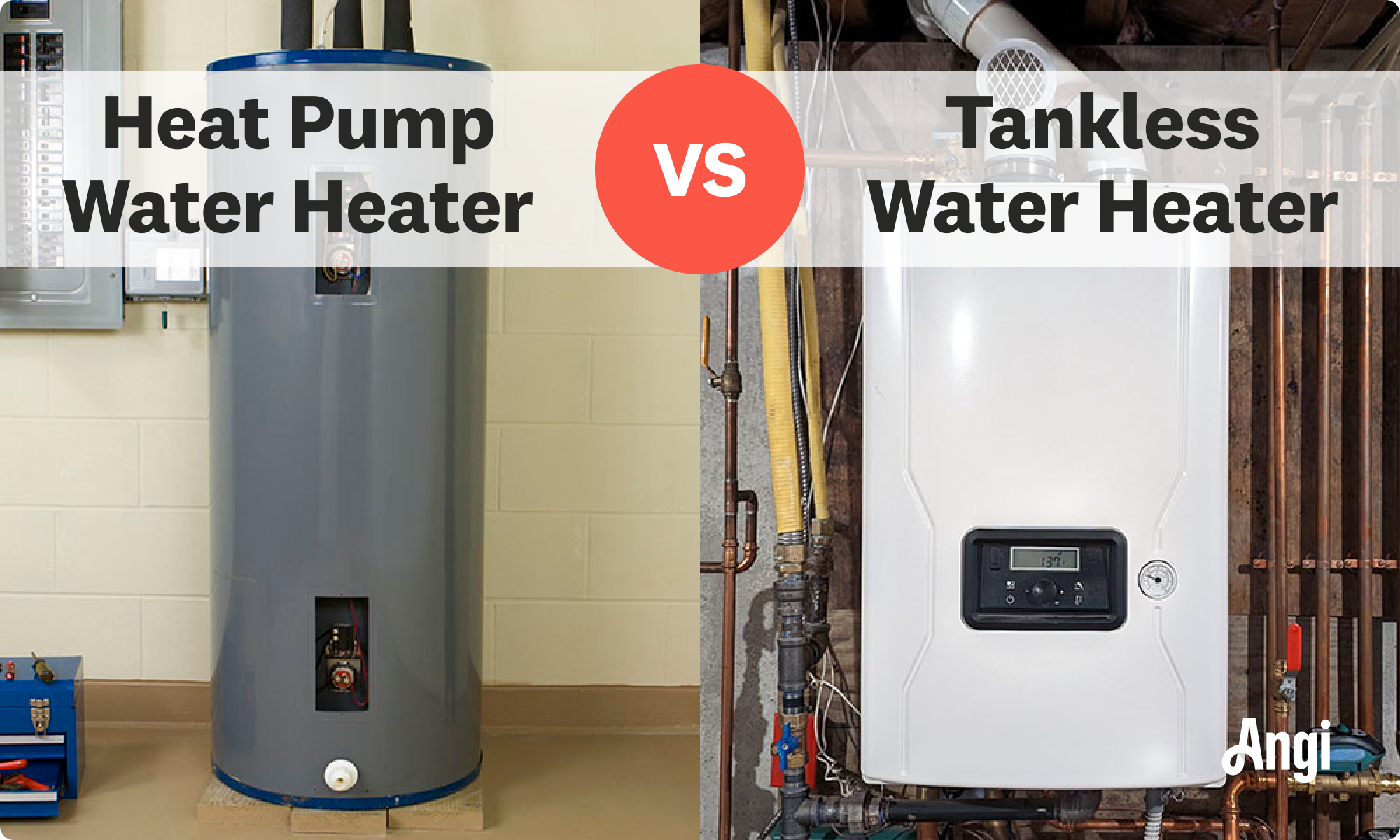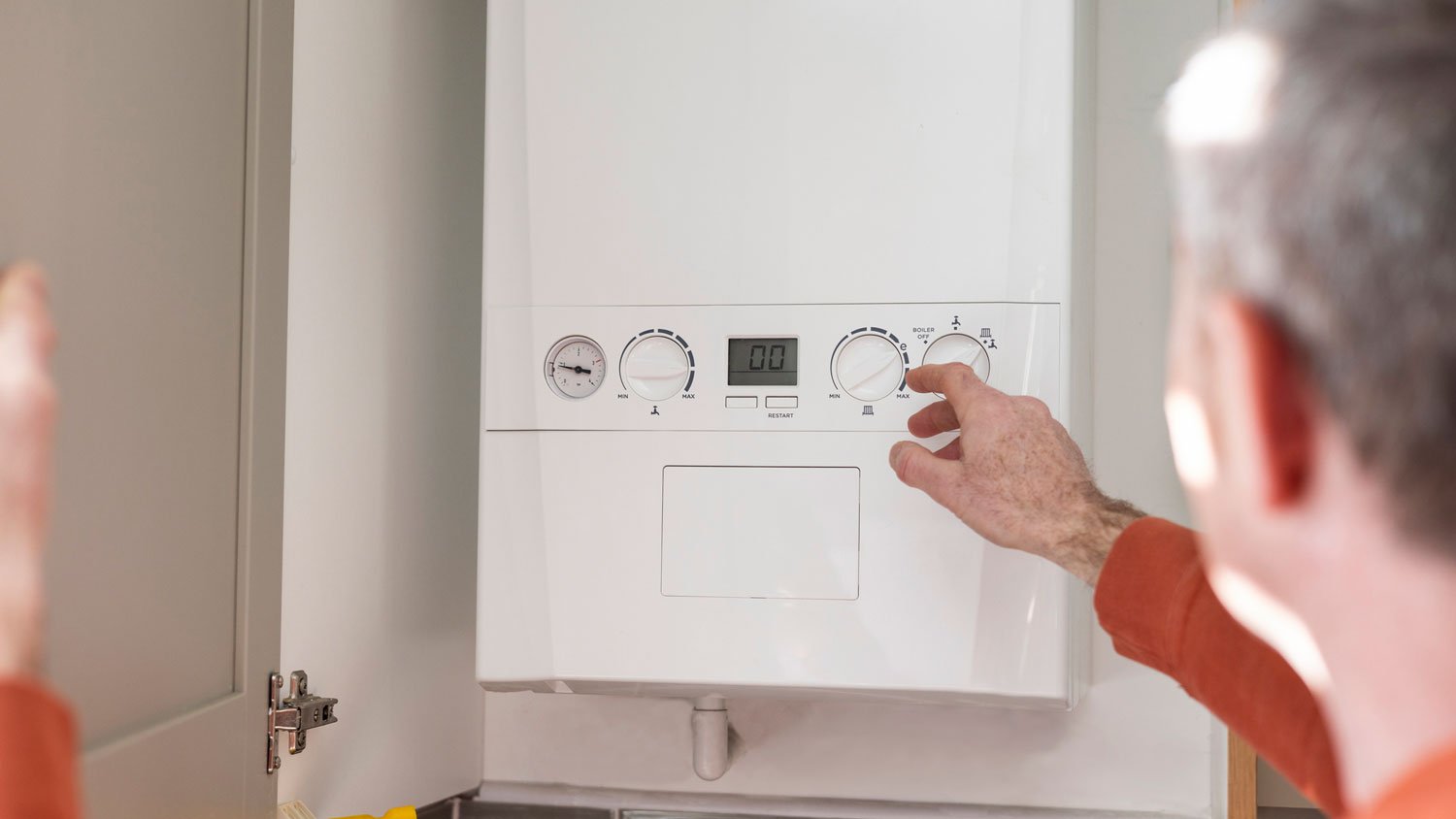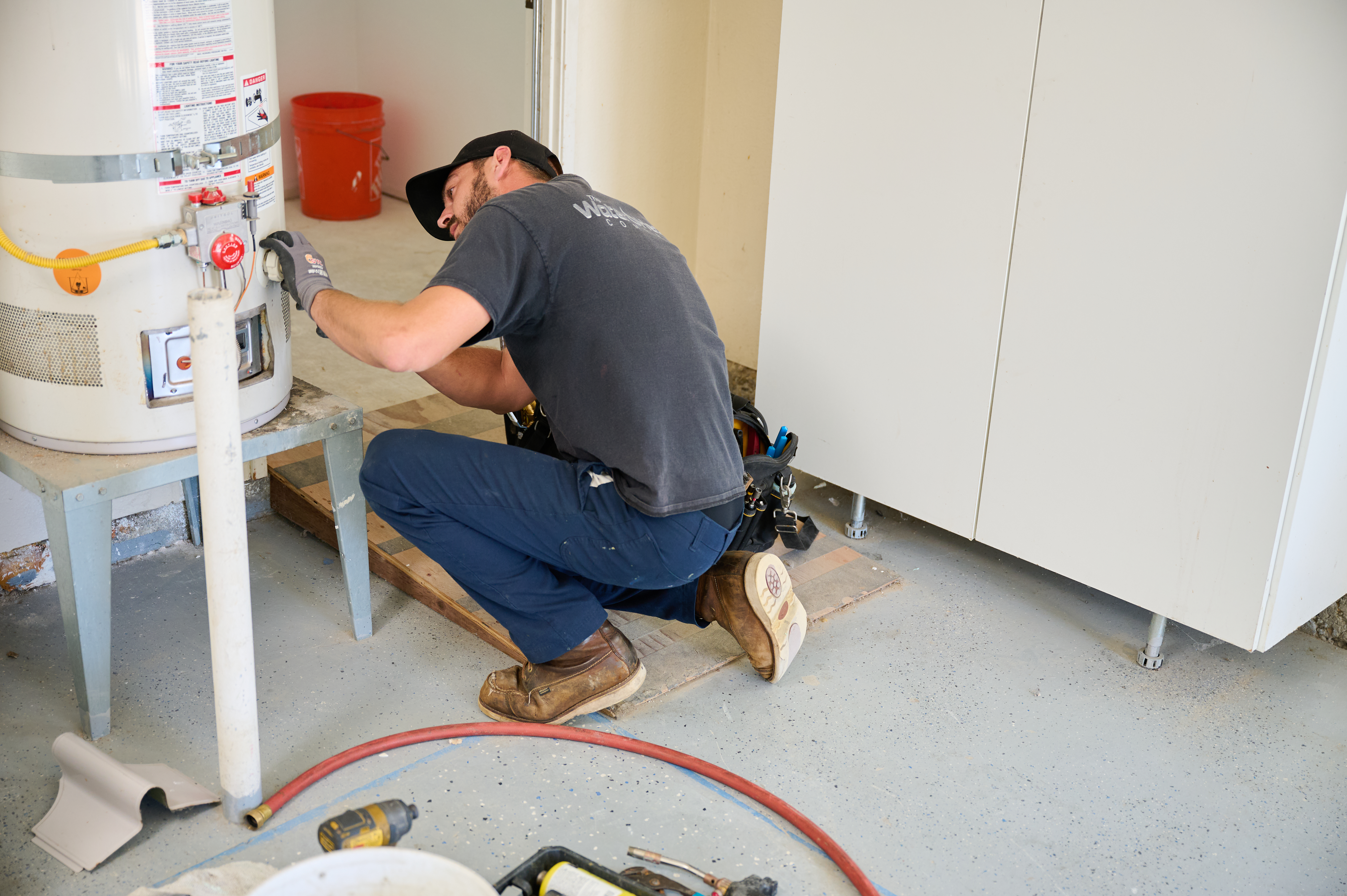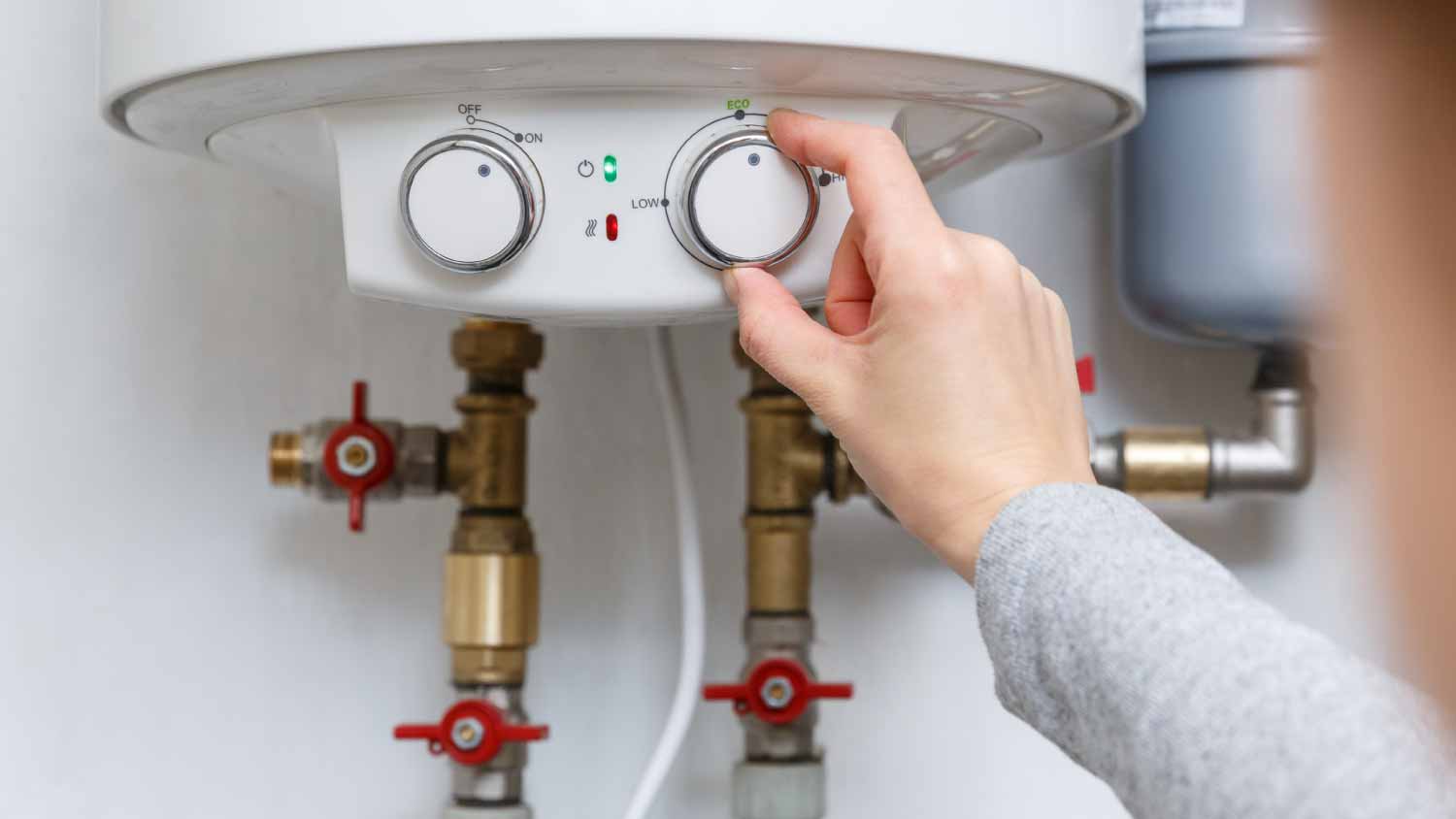
Wondering how much a water heater expansion tank costs? Use this cost guide to get an accurate estimate and learn how to choose the right one for your home.
Some like it hot—and energy-efficient


Both types of water heaters are energy-efficient options.
Heat pumps are less expensive to install than tankless water heaters.
Tankless water heaters are ideal for small homes or apartments, while heat pumps require large space for the unit.
Keeping a steady supply of hot water throughout your home brings ease and comfort. But should you choose a heat pump versus a tankless water heater? Both are energy efficient but have their own pros and cons. Compare the two options to find the best solution for your household.

Heat pumps and tankless systems are two energy-efficient types of water heaters, but each operates a bit differently. A heat pump water heater uses electricity to transfer heat, while a tankless water heater heats water on demand using electric coils or a gas burner. While heat pump water heaters are more energy-efficient and eco-friendly, tankless water heaters last longer.

A heat pump water heater, also called a hybrid water heater, is an energy-efficient appliance that heats water by transferring heat from the surrounding air rather than generating heat directly. It works like a refrigerator in reverse, using a compressor and refrigerant to extract warmth from the air and transfer it to the water stored in its tank.
| Pros | Cons |
|---|---|
| Energy efficient | Large space requirements |
| Less expensive than tankless | Shorter lifespan than tankless |
| May qualify for tax incentives | Lower performance in cold climates |
| Durable | Complex installation |
Best for:
Large homes with plenty of space
Households with high hot water demand
Heat pump water heaters use up to three times less electricity than traditional electric water heaters by transferring heat instead of generating it. This significantly reduces energy consumption and lowers utility bills, boasting cost-effective benefits. Opting for a geothermal heat pump can deliver even greater cost savings. Since the water heaters run on electricity versus gas, they contribute to a smaller carbon footprint, making them an environmentally friendly option.
Heat pump water heaters are less expensive than tankless heaters. The average cost to install a heat pump water heater ranges between $1,200 and $3,500. The upfront cost can be further reduced through tax incentives. Eligible models may qualify for a 30% tax credit, up to $2,000, under the Energy Efficient Home Improvement Tax Credit. Heat pump water heaters are also highly durable, lasting longer than traditional models with proper maintenance.
Heat pump water heaters require space in the home for a tank and heat pump unit. Because they also need sufficient airflow to operate efficiently, they're less suitable for small homes or tight spaces.
While heat pump water heaters last 10 to 15 years, tankless water heaters can last up to 20 years with proper maintenance. Heat pump water heaters perform lower in cold climates because they rely on extracting ambient heat from the surrounding air. In colder regions, efficiency drops, which may require backup heating elements. Installation is also more complex and requires hiring a local water heater installer.

Tankless water heaters heat water directly as it flows through the unit instead of storing it in a tank. When you turn on a hot water tap, cold water travels through the heater, where it's quickly heated by either electric coils or a gas burner. There’s no need for a storage tank, so it saves space compared to traditional water heaters. Let's check out the pros and cons of tankless water heaters.
| Pros | Cons |
|---|---|
| Long lifespan | Higher cost |
| Heats water quickly | Not ideal for large homes |
| Small space requirement | Lacks efficiency |
| Quiet operation | May require new plumbing |
Best for:
Small homes with limited space
Households with on-demand hot water needs
Tankless water heaters are a great space-saving solution because they require a smaller space than traditional water heaters, including heat pumps. Without a bulky tank, they can be mounted on a wall, making tankless water heaters worth it for small homes or apartments. They provide endless hot water on demand rather than storing it in a tank, eliminating the worry of running out of hot water mid-shower.
With proper maintenance, a tankless water heater can last 15 to 20 years. They also operate quieter since they don't have a constantly running tank. While some traditional tankless models may produce noise, newer designs are much quieter.
Tankless water heaters have a higher upfront cost than heat pumps and traditional water heaters, with a range of $1,400 to $3,900. While the cost difference isn't significant compared to heat pumps, most tankless systems don't qualify for tax credits. Installing a tankless water heater may require new plumbing and ventilation, adding to the installation cost.
Tankless water heaters can struggle with high water demand, making them less ideal for large homes. Multiple appliances, like showers or dishwashers, running at the same time can overload the system. Lukewarm water takes the place of a steady supply of hot water, even when turning up the water heater temperature. The correct tankless unit size can help mitigate this issue, but even larger models may not provide enough hot water for households with high simultaneous usage.
Heat pumps and tankless water heaters are both energy-efficient options in different ways. Heat pump water heaters excel in energy savings by transferring heat rather than generating it, using up to three times less energy than traditional electric water heaters. Tankless water heaters offer efficiency by heating water on demand, eliminating standby heat loss, a common issue with traditional options.
Tankless water heaters are less prone to the wear and tear associated with compressors and other water heater components found in heat pumps. With proper maintenance, they are also more durable, making them a better long-term investment.
Heat pump water heaters are more affordable upfront than tankless models. The initial cost of a heat pump water heater ranges from $1,200 to $3,500, while tankless water heaters cost between $1,400 and 3,900. In addition to its lower cost, heat pumps are eligible for tax credits.
Tankless water heaters are smaller than heat pumps and are wall-mounted, requiring less space. They're also simpler to integrate into existing plumbing and electrical systems. The installation process for tankless systems is quicker and less invasive, and heat pump water heaters need more space for both the tank and the heat pump unit.
A tankless water heater is easier to repair because it has fewer complex components. Common tankless issues like mineral buildup, ignition problems, or sensor failures can be fixed DIY. Heat pumps involve refrigerant systems, compressors, and electrical components that require professional servicing. The cost to repair a hot water heater ranges between $230 and $990.
Tankless systems require less frequent maintenance, with the primary concern being descaling to prevent mineral buildup in areas with hard water. Heat pump water heaters require regular maintenance of the air filter and servicing of the compressor. Both types require periodic flushing. The average water heater flush cost for a tank water heater ranges between $75 and $150, while tankless systems cost between $150 and $250.
With proper care, tankless systems can last 15 to 20 years, but heat pump water heaters only have a lifespan of around 10 to 15 years. The longevity of a tankless water heater is partly due to its simple design and the absence of a storage tank, which is prone to corrosion over time.
From average costs to expert advice, get all the answers you need to get your job done.

Wondering how much a water heater expansion tank costs? Use this cost guide to get an accurate estimate and learn how to choose the right one for your home.

Tankless water heater costs in Columbus, OH depend on the size of your water heater, location, fuel type, and more. Keep reading to calculate your expenses.

A water heater flush costs $160 on average but can vary based on the unit size, type, labor, location, and more. Keep reading to learn how much you could pay.

How much do water heaters weigh? The answer depends on the type of water heater, its size, and several other factors. Read on to learn more.

If your water heater is getting warm but not hot, a faulty thermostat, sediment, or more could be to blame. Learn how to spot and solve the problem of a water heater that’s not hot enough.

A lack of hot water can easily upset the household. Here are nine reasons why your electric hot water isn't heating and what you can do next.